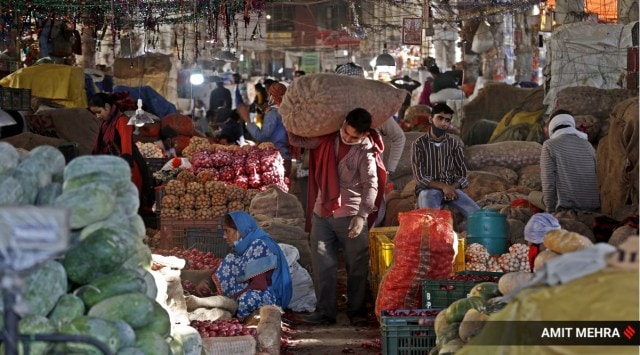- India
- International
By amending Model Mandi Act, MP has pushed its agricultural sector into throes of uncertainty
The state has posted high growth rates in the agricultural sector in recent years, but the growth has been skewed in favour of the state's irrigated parts and a small number of crops.
 A reduction in mandi cess on the traders from 1.7 per cent to 0.5 per cent in October this year has weakened the revenue-generating capacity of the mandis.
A reduction in mandi cess on the traders from 1.7 per cent to 0.5 per cent in October this year has weakened the revenue-generating capacity of the mandis.Madhya Pradesh is primarily an agricultural state. One third of its gross state domestic product comes from this sector, half of the state’s area is used for cultivation, and 70 per cent of the total workers and 85 per cent of the rural workers are dependent on agriculture for livelihood (“Madhya Pradesh Agriculture Economic Survey” 2016). The state has posted high growth rates in the agricultural sector in recent years, but the growth has been skewed in favour of the state’s irrigated parts and a small number of crops. High agricultural growth has, thus, been accompanied by an increase in the number of farmer suicides and regular incidents of dumping of unsold produce on the highways by farmers due to sharp declines in prices. Farmer agitations, taking place at frequent intervals in the state, have, however, failed to attract national attention, barring the 2017 Mandsaur incident in which five protesting farmers died.
The Shivraj Singh Chouhan led BJP government in the state has put all its weight behind the new agricultural laws, giving verbal assurances to the farmers that the reforms will give them more freedom, help in augmenting their incomes and act as a cushion against adverse price fluctuations. These claims merit a close scrutiny.
The first claim is that the reforms will not affect the functioning of the mandis. Now, the Krishi Upaj Mandi Act, 1972, which governed the state’s 259 mandis, was recently amended, and the Model Mandi Act passed in May 2020 allowed traders to make purchases outside the mandis without any levy. Even though the state government has repeatedly tried to assure farmers that mandis will not be affected by the new farm laws, in the first six months of the amendments, there has been a significant decline in their business. Moreover, a reduction in mandi cess on the traders from 1.7 per cent to 0.5 per cent in October this year has weakened the revenue-generating capacity of the mandis. This has already translated into a shortage in funds, required for the maintenance of these mandis and the payment of salaries of around 6,500 employees, excluding the registered labourers. Employees of the mandi board have organised protests in the state capital, complaining of non-payment of salaries, but no solution has been implemented regarding the revenue shortfall of the mandis. Instead of paying heed to the demand for overhauling the functioning of mandis and making them more democratic, dynamic and transparent, the reforms seem to have broken the back of the existing set-up.
The second claim is that reforms will augment incomes. Now, tremendous increase in wheat production is one of the prominent factors which has contributed to MP’s high agricultural growth. State policy has incentivised wheat production through increased procurement, bonus over MSP and improvements in irrigation facilities in certain parts of the state. The Madhya Pradesh Civil Supplies Corporation has expanded its capacity manifold over the years and large investments have been made by the state machinery in developing its agricultural marketing apparatus. There has been a massive increase in wheat procurement by the state over the last decade. Even with the lockdown restrictions in place in 2020, Madhya Pradesh procured record levels of wheat, amounting to one-third of total wheat procurement in the country. It is instructive to remember that the APMC/MSP regime came to the rescue of wheat farmers in the midst of the pandemic, when private buying dried up. However, in the recent speeches and writings of the state’s Chief Minister, this achievement of the state government has been conspicuous by its absence. The new reforms, in fact, mark a sharp U-turn in the state government’s policy stance and will lead to the collapse of the investments, made in strengthening agricultural markets.
The third claim is that private trade will help in better price discovery. Wheat was procured by the Madhya Pradesh state government during April-July 2020 at the minimum support price of Rs 1925 per quintal. Fieldwork done (as part of a larger research project) in villages of Hoshangabad, the largest wheat producing district, show that most of the produce was sold to the state government at MSP. The rates of wheat in the open market in Hoshangabad during the time of the harvest, as well as now, are hovering around Rs 1,450 per quintal. The price which was supposed to act a floor, actually turned out to be the best a farmer could get for his produce. Similarly, maize and moong crops, for which there was no procurement by the state, are being sold in Hoshangabad at Rs 1,000 and Rs 6,000-6,500 per quintal respectively, whereas the MSP announced for these crops is Rs 1,850 and Rs 7,196 per quintal. Incidents of farmers destroying standing crops of vegetables like cauliflower and tomatoes in the face of high cost of cultivation and extremely low prices have become common in the state and elsewhere.

The fourth claim is that of the freedom to sell anywhere. This assurance by the central as well as state governments should be seen in the light of a recent address by the Chief Minister of Madhya Pradesh (delivered at Nasrullaganj, Sehore District on December 3, 2020) in which he claimed that trucks from neighbouring states will be confiscated and only the state’s produce would be purchased. Identical observations have already been made by several other states, such as Haryana. Diverging political calculations at the state level and at the Centre often result in such contradictory statements. Similar tropes of “One Nation, One Market” and freedom to the farmers to sell anywhere were utilised in promotion of eNAM Scheme, which has largely remained a non-starter in the four years of its existence in the state.
Instead of capitalising on the investments already made, and strengthening the agricultural marketing structure, the state government, through its amendments to the Model Mandi Act and its unconditional support to the farm laws, has pushed its agricultural sector into the throes of uncertainty.
The writer is a PhD scholar at Jawaharlal Nehru University, Delhi
EXPRESS OPINION
Apr 24: Latest News
- 01
- 02
- 03
- 04
- 05










































